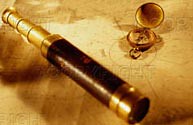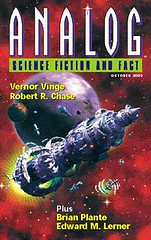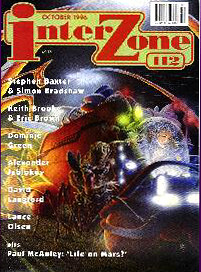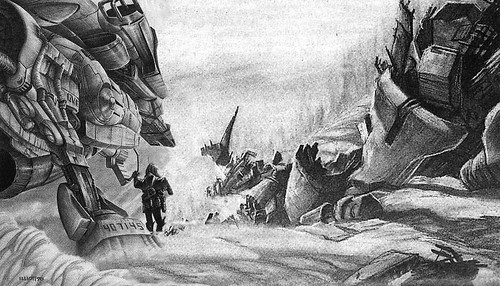"The Wonder Spyglass" Science Fiction Reviews - Issue 12
 THE WONDER SPYGLASS. Part 12 - October 2006, 1996 Read other issues here Retrospective Fiction Reviews This month in the fantastic literature: going back by 10-year jumps. Only includes the stories I've read personally. Click on the thumbnails to enlarge cover images. The idea of these "time trips" - to highlight the particular stories throughout SF&F history (all 100 years of it). Each month I will publish (time permitting) SPYGLASS issues, giving selective reviews to stories, collections, original anthologies and novels, choosing out of literally thousands of stories I've read - for example only stories which appeared in a particular month in SF magazines, and taking jumps of 10 years in SF history. This is a way for me to gradually go through stories and fill out the reviews, and a way to get a fun perspective on the genre. This issue will highlight stories from October of 2006-2005, 1996-1995 ============================ RECENT YEARS: October 2005 ----------------------------------------------  Vernor Vinge "The Cookie Monster" © Analog, Oct 2003 --novella : 2004 Hugo W --novella : 2004 Locus W --novella : 2004 AnLab /3 --/ second place sf novella --/ wonder award --/ idea award --/ awesome scale Do you remember the "Office Space" movie? It seems like Vernor Vinge buried "his red stapler" inside this haunting novella, so that his readers will be plagued by images of corporate hell worthy of Dilbert's worst. It certainly puts a stop to dreams of a cozy desk job in sunny California, grazing around the campus of some hip computer corporation. Instead of perks, freedom and stability the employees here get something quite different... and you get a sinking feeling from the moment the first email arrives in the story. I enjoyed this novella as much as "The Matrix" movie, perhaps even more. It's classier, more hilarious, although deceptively simple: most of it happens inside a generic industrial park, with the main characters having a reckless adventure... by walking from one building to the other. Soon, however, the daily grind turns into a nightmare (and/or conspiracy) worthy of Kafka and Philip K. Dick. As our characters realize that they have become part of the biggest reality scam since "The Truman Show", they have nothing left to do but to slowly trickle their brains on the pavement, hoping to "cool off" their thought processes, or to shuffle around in a zombie-like fashion, trying to figure out the implications of the plot. A few years back, Vinge popularized the "singularity" concept, in which he predicts that humanity will be left in the dust in the wake of self-evolving software. This writer knows how to handle the vastness of concept, how to tighten the plot with the velvety gloves of the reader's own fears and paranoias. It all starts with an email (just like for Neo it all starts with a call on his cel) ... but soon the workplace transforms into something else, and time itself is bending out of shape. What is going on? I won't spoil it for you - hopefully you will find the magic "red stapler" yourself and break out of the "hamster cage paradigm", at least in your mind. review: 4-Oct-06 (read in 2005) ---------------------------------------------- Eric Schaller "The Five Cigars Of Abu Ali"  © Sci Fiction, Jan 2005 --/ fourth place f story --/ wonder award --/ style award --/ idea award This story is really fun. You might not laugh out loud, but you will have a few amusing minutes, contemplating the predicament of the central character, who messes around with a genuine Genie and his ambiguous present. This is a modern-day adaptation of a centuries-old myth of Aladdin, and it is every bit as fresh and interesting as a Disney version. "Abu Ali is a traveling rug dealer with a penchant for cigars. On one of his rug acquisition trips, he discovers a strange Coca-Cola bottle in a tiny shop, and when he uncaps it, a djinn, in classic storybook tradition, emerges. The djinn presents his rescuer with a gift, in this instance a magical cigar, which will impart untold riches when smoked. But djinn-kind are known to be tricksy and wicked. What cost to smoke the cigar?" (Tangent reviews) Eric Schaller is definitely a writer to watch, as he has a visual, engaging style, filling the narrative with a "Richness of Detail" rarely seen nowadays, without boring the reader. In other words, he is the next Steven Spielberg of the genre, if only he would put himself to it with true abandon. (unfortunately, he holds some other jobs which may stump his output... did I made myself clear enough that I can't wait to read more of his stories?) review: 9-Oct-06 (read in 2004) ---------------------------------------------- Howard Waldrop "The Wolf-man of Alcatraz"  © Sci Fiction, Oct 2004 --short fiction : 2004 British SF --short story : 2005 Locus Poll --/ cool f story Another werewolf story? Yawn... Another Howard Waldrop story? Well, let me get out a cigar and let's discuss it at length, gentlemen. His stories are an acquired taste, but they are truly "his own" creations, much like R. A. Lafferty stories are. As Chris Barnes puts it: "That solidity doesn't lie just in the voice of the story, but in the details. The cell door isn't just a door, it's a Diebold vault door with a chrome-steel lock. The wolf-man, Bob Howlin (great name!), doesn’t just chew gum, he chews Beeman's Black Jack. Howlin's fascination with lunar astronomy is a masterful touch, and the reference to 17th Century fantasies about lunar voyagers is pure Waldrop. As is the unexpected and poignant ending." Link to story: here review: 9-Oct-06 (read in 2004) ---------------------------------------------- Kim Newman "Soho Golem"  (Jeperson series) © Sci Fiction, Oct 2004 --novella: 2005 World Fantasy Award --/ cool f novella Like a modern-day Michael Moorcock extravaganza, spiced up with various popular culture references, and wrapped up into a "devil-may-care" narrative not unlike the Cornelius Chronicles on steroids... or on Hollywood juice... or simply on a DJ's stash of energy-drinks. Like a loud disco night in an era of sophisticated "Electric Light Orchestra" arrangements, this novella stands out in a lurid, brash way, with curiously slurred dialogue and even a touch of "Clockwork Orange-wannabe" self-invented slang. It was nominated for World Fantasy Award, but did not do much for me except kept me wondering what the "noise" is all about. A Victorian steampunk mystery populated with tripping Hippies, time-warping Nazi demons, ancient spirits and dreadlocked Rasta zombies. Sounds like fun, but takes an effort to wade through. review: 12-Oct-06 (read in 2005) ============================ A DECADE AGO: October 1996, 1995  David Langford "The Spear of the Sun" (Father Brown) © Interzone, Oct 1996 --/ cool sf story --/ idea award There are many "alternate history" SF stories, but this one is about an alternate history of science fiction itself. An unusual pastiche on G. K. Chesterton's "Father Brown" series, it positively glows with invention and wit. "Written in the world where G.K. Chesterton's "Father Brown" stories somehow mutated into SF, thousands of stories have been set in the shared "Father Brown" universe, and "G.K. Chesterton's Science Fiction Magazine" is more or less the only genre magazine..." I was not awfully impressed, however. The story reads good as a novelty, but otherwise quickly wears off. It's light fare that's good to read on a sunny afternoon with a soft breeze in your hair. review: 12-Oct-06 (read in 2003) ---------------------------------------------- Allen Steele "The Death of Captain Future"  (Captain Future series) © IASFM, Oct 1995 --novella : 1996 Hugo W --novella : 1996 Locus /6 --novella : 1996 Asimov's Reader Poll /7 --novella : 1996 SF Chronicle /2 --novella : 1997 Nebula --foreign short fiction : 1998 Seiun W A noble effort. This is genuinely heart-warming! Somebody not only remembers Captain Future, but sets out to write a tribute to the old "salty dog of the spaceways". On top of that, this somebody is not some novelty or one-shot-parody producer like Silverberg or Mike Resnick or such, but a toughened space fiction professional Allen Steele. No wonder I started to read this novella with a pleasant goosebumps of expectation, waiting to lap up the successful entry like a grateful puppy. But this was not to be. I was disappointed. The adventure is there, the aliens and villains are more sophisticated and street-smart, the polit-correctness (in the form of pervading cynicism) is there as well, and the charm is irrevocably gone. I am not even speaking of yellowed pulp pages charm and cheesy dialogue and primitive plot charm, which would be a good riddance after all, but the romance of the spaceways and the gleam in the eye of an intrepid space explorer are gone... Supressed by smooth (and quite unexciting) story-telling, run-of-the-mill "reality show" dialogue and the general contemporary feel - which in its "Ikea" enthusiasm did away with the fancy baroque embellishments of Forties pulp fiction. Still it's a good effort (it even won a Hugo award), but it will not be added to my "Captain Future" collection, even as a successful parody. To be a parody, or even a pastiche, it needs a good deal more excitement and humour. However, as it stands, it's quite flat and unmemorable (like eating tofu cheese). Alastair Reynolds would've done a better job, with more flair and colour. review: 14-Oct-06 (read in 2005)  ---------------------------------------------- David G. Nordley "Alice's Asteroid"  © IASFM, Oct 1995 --short story : 1996 Locus /15 --short story : 1996 Asimov's Reader Poll /5 (tie) --/ cool sf story This is a prime example of how easily a "hard science fiction" space story can change into showcase of a writer's scientific knowledge, losing the excitement in the process. More and more of such competent and dry novellas are getting published nowadays, obviously being encouraged by editors and spear-headed by modern "hard sf" giants in the field. Even Larry Niven writes significantly "tamer" and "scientifically/boringly correct" nowadays. Which makes the literature of fantastic imagination a slave to scientifically-proven standards, almost a world- and physics- "syndication" in sf publishing. I know, I know, there is the fantasy genre, theoretically unbound by any science. But what of the space adventures? To my mind, Outer Space is just as wild and unconstricted by any "human scientific dogmas" as Gandalf's fireworks. Go and prove me wrong in the comments. ( I know I'm exaggerating, but I am mightily starved for fresh and non-conforming space fiction) review: 14-Oct-06 (read in 2003) ---------------------------------------------- Geoff Ryman "Warmth"  © Interzone, Oct 1995 --short fiction : 1996 British SF --fiction : 1996 Interzone Poll When I went to write this review, I typed Greg Egan instead of Geoff Ryman, subconciously noting the similarities between these two writer's styles, and differences. Geoff Ryman imbued this story with more "warmth" (pun intended) than Egan ever would. (or Asimov, for that matter) The subject matter of this story is pure Asimov - it's about an emotional attachment that a child develops toward its robot nanny. Nothing new, but handled well and smoothly written. review: 14-Oct-06 (read in 2003) ---------------------------------------------- Nancy Kress "Evolution"  © IASFM, Oct 1995 Beaker's Dozen, 1998 --novelette : 1996 Locus /5 One Amazon reader summarizes this tale nicely:""Evolution" takes a very serious topic, antibiotic-resistance in bacteria, and turns it into a bland, Shirley Jackson-esque tale of people becoming uncivilized. I kept thinking after the first few pages, "Ok, I get it. Why should I keep reading?" Yeah, same here. Of course the subject matter is frightening, but the tale is sleep-inducing at most. review: 14-Oct-06 (read in 2003) ---------------------------------------------- James P. Hogan "The Immortality Option" (nv)  (Code Of The Lifemaker 2) © 1995, Ballantine Del Rey --series: 1984 Locus /26 --overseas long fiction : 2000 Seiun --/ cool sf novel --/ wonder award --/ idea award This one is a curious literary "fish": on one hand it's a sharp and very competent (and well-researched) epic about the possibilities of robotic evolution, life-codes, AI power games and such. But on the other hand, it is an ungodly mess. The writer mixes the themes, ideas and extrapolations like a retired IBM maniac, or a typical pulp "mad scientist", little caring for the readability or even a slightest character development (in fact I doubt there were even human characters at all, throughout its 400 pages). It reads as an article, as a tractate, or as a Ph. D. thesis, but I cannot call it a novel. Granted it has a tremendous scale and exciting visions of robot cultures and AI domains - but it only serves to re-inforce the "mad scientist ramblings" impression. It's lofty stuff, but after a few chapters you will feel as though your head were cooked in an alchemist's bubbling alembic vessel, and be very fortunate indeed to escape to fresh air. review: 14-Oct-06 (read in 2003) ---------------------------------------------- Well, sadly, there were no winners in this Spyglass issue for October 1995-1996, but of course these were only random pickings. Surely in the Eighties, in next Spyglass, we will fish out more exciting stuff? We'll see. Read other issues here CONTINUE TO NEXT PAGE ---------------------------------------------- Labels: Spyglass |
Click to go to "Dark Roasted Blend" site

|
Collecting Pulp Magazines Ephemera Interview with Avi Abrams |

|
Enchanting Victorian Fairy Tale Art "Then world behind and home ahead..." |

|
Exceptional British Scifi Artwork from the 1950s Space Pulp Art by Ron Turner and other British artists |

|
Pulp Pleasures: Eando Binder Great space adventure fiction from the 1930s "Where Eternity Ends" and other rare gems |
Also read recent posts:
Author's Pen Names - Most Complete List Ever
The Wonder Timeline: SF&F Restrospective
Space Adventure Article
|
"SF&F Reading Experience" is part of "Dark Roasted Blend / Thrilling Wonder" family of sites. We try to highlight the most entertaining and rewarding science fiction and fantasy, with emphasis on memorable reader experience, not necessarily general acceptance by the critics. Have fun, and delve into our extensive ratings and reviews! Most reviews are written by Avi Abrams, unless otherwise noted. Reviews also appear on our unique historical retrospective page Wonder Timeline of Science Fiction. Feel free to submit your own review, if a particular story is not listed here. All major OFFICIAL AWARDS are highlighted in BLUE ("winner" has a letter "W" by it, otherwise it is a runner-up only) Our PERSONAL AWARDS (ratings) are highlighted in RED and PURPLE: --/ first place : --/ second place : --/ third place : --/ fourth place : --/ cool : (equal to fifth place) ALL "BEST OF" LISTS ARE LOCATED HERE These awards are given in the following categories: - novel : - series : - novella : - story : - collection : Also, there are our personal STYLE / GENRE SPECIFIC AWARDS. These reflect the story's content and the lasting impression on the reader: --/ wonder award sense-of-wonder, "visual intensity" and inventiveness --/ idea award originality of idea / concept --/ adventure award exhilarating plot, excitement / action --/ style award outstanding literary qualities, inimitable style --/ romance award intense and beautiful love / relationships --/ humour award funny and cool --/ emotion award touching, lasting impression, sensitivity --/ shock value altogether wild --/ awesome scale mind-boggling; further enhances sense-of-wonder --/ rare find very hard to locate, mostly from old pulps, never reprinted, etc. Again, please feel free to leave your own review or comment under every writer's entry; also recommend us other stories you liked. |

5 Comments:
No kidding about that balance between keeping the science true but keeping the excitement and imagination alive. It takes true genius and a sharp wit to write with both.
I must admit I do comesorate with you on the lack of genuine space adventure sort of fantasy/unrealistic type of stories. I am a writer, and I do have this tendency to want to keep my science fiction more science than fiction. But every now and then I wish I could just write whatever I want to and have no regard for the science of it at all. So, I write fantasy. But I find that I'd love to write some sort of space adventure with no limits... and you're right, there shouldn't be a problem doing this. So your comments have convinced me and encouraged me – there IS some space out there for just fun space romp with cool ideas that don't necessarily have to be scientific in any way at all!
Thank you Rug
you made my day
Since high school I was already into sci-fi. I think I am going to be an avid visitor of your post. By the way, how about giving a review to sci-fi movies in addition to sci-fi books and novels you have read?
Great! I may review sf movies if I have more time.. ha!
Post a Comment
<< Home